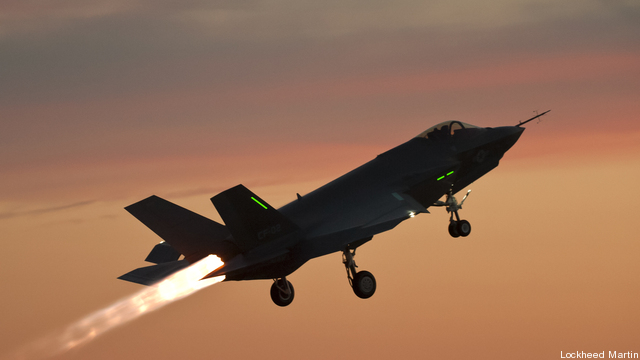Gen. Amos, Adm. Greenert: F-35 Essential But Procurement ‘Constipated’
Posted on
 NATIONAL HARBOR: The top officers in the Navy and Marine Corps defended their most expensive program, Lockheed Martin‘s troubled F-35 Joint Strike Fighter, while acknowledging the way the Pentagon buys such weapons is not merely broken but “constipated.”
NATIONAL HARBOR: The top officers in the Navy and Marine Corps defended their most expensive program, Lockheed Martin‘s troubled F-35 Joint Strike Fighter, while acknowledging the way the Pentagon buys such weapons is not merely broken but “constipated.”
“There’s no alternative for the United States Marine Corps to the F-35B,” Commandant Gen. James Amos said at the opening session of the Navy League’s annual Sea-Air-Space conference. “I want to make that crystal clear to everybody in the audience.” All the great aircraft of the past have gone through teething troubles in development, said Amos, a pilot himself.
“Speaking for the Navy,” added the Chief of Naval Operations, Adm. Jonathan Greenert, “I need the fifth-generation fighter, and that [F-35] provides it, so we’re all in — but it has to perform. It has problems; it is making progress.”
“I do not at this point believe that it is time to look for an exit ramp, if you will, for the Navy for the F-35C,” continued Greenert, who in the past has damned the Joint Strike Fighter with similar faint praise.
Their commitment to the aircraft aside, both men acknowledged – in response to a pointed question from Reagan’s Navy Secretary, John Lehman — that the procurement process which produces systems like the F-35 is a mess. “The process is constipated,” said Gen. Amos. “It’s broke.”
For example, when the Marines decided to cancel the troubled Expeditionary Fighting Vehicle in 2010 and replace it with a new armored transport to move Marines from ship to shore, Amos noted, the acquisition bureaucrats told him it would take until 2023 to field the first such Amphibious Combat Vehicle — 13 years.
After years of acquisition “reforms” that have empowered the civilian Department of Defense bureaucracy at the expense of the uniformed services, “the service chiefs need to get back in,” said Amos. “Congress doesn’t give the program manager a dime, they give the service chiefs the money… It’s our money, these are our programs.”
Agreed Greenert, “I as a service chief would like to have more authority and more accountability in acquisitions.” There are far too many different bureaucratic entities with input into the “requirements” for new systems, but none of them is held accountable for the delay and expense produced by the waffling back and forth over an ever-longer wish list. The buck should stop with service chiefs like himself and Amos, Greenert argued — which may well require Congress to reexamine the landmark 1986 Goldwater-Nichols Act “and consider altering it.”
“We’re going to have to break some china to change this,” agreed the third senior officer present, the Coast Guard’s vice-commandant, Vice Adm. John Currier. “The way forward is to look at a couple of pilot acquisitions…not an academic study but actual system acquisitions…and reframe how we do business based on that experience.”
Subscribe to our newsletter
Promotions, new products and sales. Directly to your inbox.
